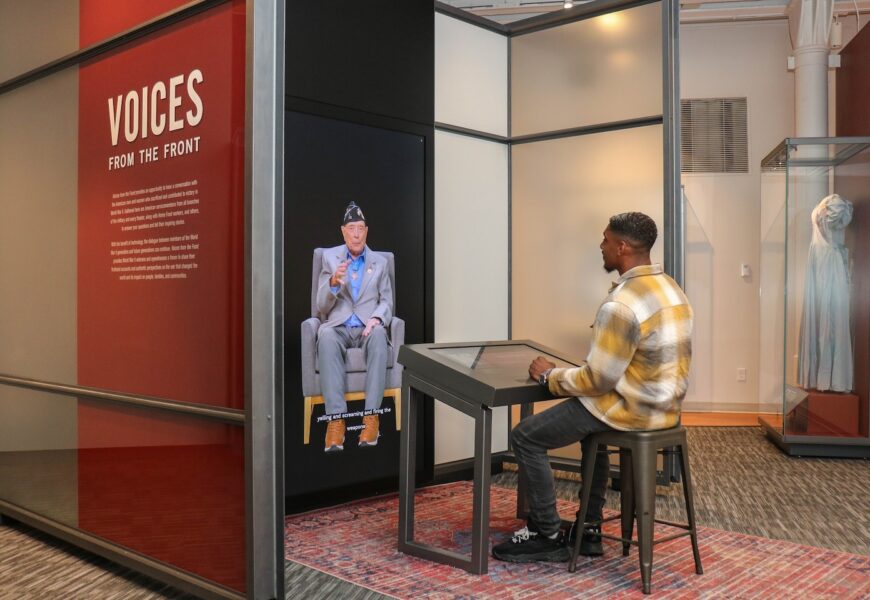Margaret Kerry-Boeke, aged 94, confidently entered a museum at the National WWII Museum in New Orleans, only to come to an abrupt stop. Her gaze fixed on a sight that seemed to reflect her own image back to her, a vivid portrayal of her past captured in a lifelike video.
As Kerry-Boeke recounted her experiences as a USO performer on the home front during World War II, she sat elegantly in an armchair, her legs crossed at the ankles, showcasing her vibrant red ballet flats. “I often performed multiple shows and was frequently requested for encores,” she reminisced.
A member of the dwindling cohort known as “the greatest generation,” Kerry-Boeke represents a fading era of history.
Each day, 131 World War II veterans pass away, according to statistics cited in the gallery. Leveraging artificial intelligence and voice recognition technology, the museum has embarked on a project named Voices from the Front, preserving the recollections of those who lived through that pivotal period for future generations to engage with.
Out of the 16.1 million Americans who served in the war, a mere 119,550—less than 1 percent—remain alive, based on recent data from the U.S. Department of Veterans Affairs. By 2036, it is projected that only a few hundred of these veterans will still be with us.
“We’re in a race against time,” remarked Peter Crean, a museum vice president and retired U.S. Army captain who spearheaded the Voices from the Front initiative.
The museum, with the support of a generous $1.5 million donation, has employed cutting-edge technology to create volumetric videos of the individuals featured in the exhibit, ensuring a lifelike presence that can interact with visitors.
Kerry-Boeke, who once served as a Disney model post-war, was meticulously captured in the filming process, down to the placement of her iconic Tinker Bell brooch on her sweater. Through a series of in-depth interviews spanning nearly 1,000 questions, her digital persona now awaits visitors, ready to share her story.
The interactive exhibit utilizes voice recognition to field inquiries from visitors, with artificial intelligence guiding the selection of relevant responses from the extensive interviews conducted. This fusion of technology enables a seamless and authentic interaction with the virtual representations of these wartime heroes.
As visitors engage with these lifelike avatars, they are transported back in time, forging connections with history on a personal level. The stories shared by these veterans serve as poignant reminders of sacrifice, camaraderie, and resilience in the face of adversity.
Through innovative storytelling and immersive experiences, the Voices from the Front project not only preserves the legacy of those who lived through World War II but also offers a bridge between past and present, ensuring that their memories endure for generations to come.










